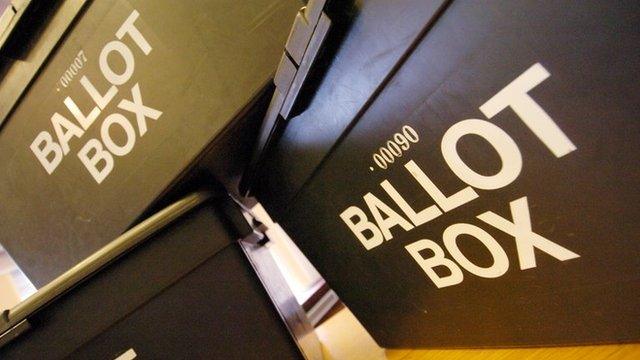Election 2015: Politicians clash over Scottish poverty
- Published
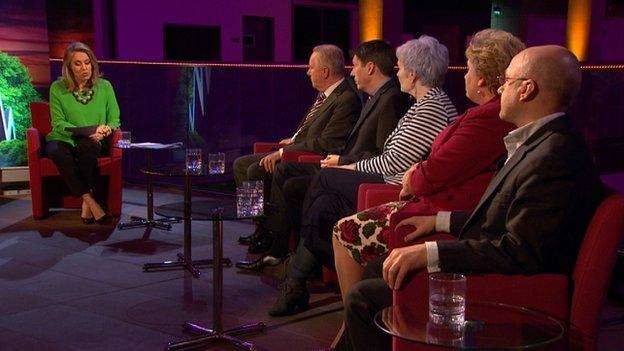
The five politicians faced questions from the studio audience and presenter Sarah Smith
Politicians from Scotland's five main parties have clashed over the causes of - and possible solutions to - poverty.
They were appearing in a BBC Scotland election debate in front of a specially invited studio audience.
It came ahead of seven party leaders from across the UK taking part in a live ITV debate on Thursday evening.
And the forthcoming general election is also expected to dominate the last first minister's questions at Holyrood before the Easter recess.
The Scotland 2015 programme's Poverty Debate, which was broadcast on BBC2 Scotland on Wednesday evening, saw senior figures from the SNP, Labour, Conservatives, Liberal Democrats and Scottish Greens face questions on topics including foodbanks, welfare sanctions, the living wage and childcare.
They were appearing before an audience largely comprised of people who work with those in poverty, or who are themselves affected by poverty.
'Real contradiction'
About a million people in Scotland - or a fifth of the total population - are said to be living in poverty, with nearly half of those living in households where at least one person is working.
Responding to a question about why thousands of people in Scotland rely on foodbanks when the UK is said to be one of the wealthiest nations in the world, Scottish Social Justice Secretary Alex Neil said it pointed to a "real contradiction" in the country.
The SNP politician said: "We are the fourth or fifth richest nation in the world and yet we have some of the worst levels of poverty in the whole of Europe, and indeed in the western world."
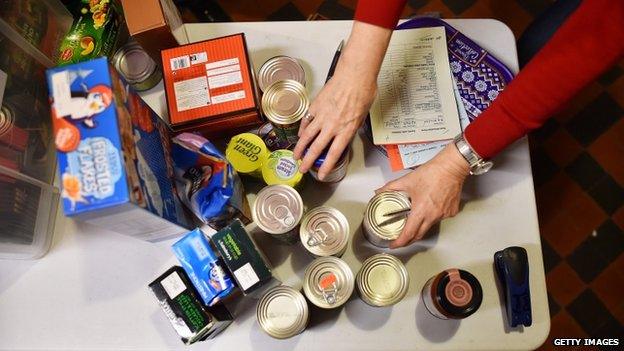
Foodbank use has increased dramatically in recent years
Mr Neil said the poverty problem started with Margaret Thatcher and had continued with subsequent prime ministers such as Tony Blair, who he claimed had "made poverty worse as well", and said governments in both London and Edinburgh should have a firm commitment to ending poverty, not just reducing or mitigating it.
Scottish Conservative MSP Mary Scanlon said the UK had the fastest-growing economy in the western world, and that per head of population there were more foodbanks in Germany than in either Scotland or the UK.
But she conceded: "That is no excuse. There is still a long way to go to address poverty. I have been on benefits myself, I have been a single parent of children one and two years old, I have been there and I have never forgotten about being there. It is hard and you do need help from government."
'Sign of hope'
Ms Scanlon said that, while there was no magic solution to poverty, she would like to see resources focused on early years and childcare, and called on governments to do more to tackle mental health issues by treating people in poverty with respect and dignity and giving them the support they needed.
Scottish Labour's social justice spokesman Ken Macintosh said foodbanks were "actually a sign of hope", because they reflected the generosity and compassion of people in Scotland.
His comment was met with an angry response from some people in the audience, with one man saying: "It is actually a sign of desperation rather than hope. It really is shameful. People don't go to foodbanks for hope."
Mr Macintosh then clarified that he believed food poverty was shameful, while foodbanks themselves were "a sign that we care for each other".
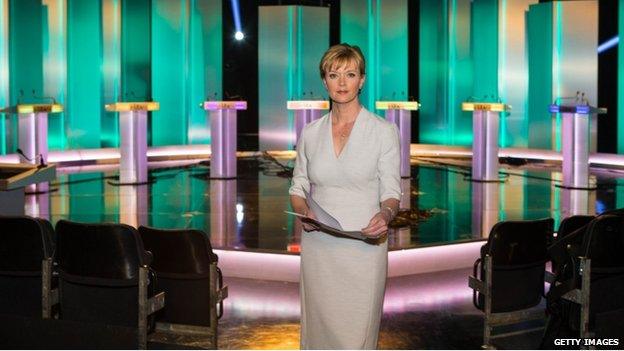
The ITV leaders' debate will be hosted by Julie Etchingham
He added: "I would like to see an end to the need for foodbanks, I want to see an end to food poverty, and that means putting money in people's pockets. There are things we could do right here, right now in Scotland. We could do more to tackle poverty wages in Scotland."
Katy Gordon, the vice-convenor of the Scottish Liberal Democrats, said the big challenge was one of income.
She said: "What the Liberal Democrats have achieved in government is to give as much money back in terms of tax cuts to those on low and middle incomes to make sure that pensioners are protected by having a triple lock on pensions so that the pensions are always going up.
"So it is about making sure that the money that people are getting, more of it they get to keep to spend."
The fifth member of the panel, Scottish Greens co-convenor Patrick Harvie, predicted that many people would feel a "great deal of weariness" when they heard the answers of his rivals.
He said: "How wealthy your country is overall is not the same as how fairly that wealth is shared, and we focus too much in this society on averages. GDP growth is one good example - it just tells you how much money is swilling around, it doesn't tell you in whose interests it is working.
"If we want a fairer society we have to share our wealth more equally."
Live coverage
Meanwhile, Scottish First Minister and SNP leader Nicola Sturgeon is preparing to face six other party leaders, including Prime Minister David Cameron, Labour's Ed Miliband and Lib Dem leader Nick Clegg, in a two-hour live general election debate to be screened on ITV from 20:00 on Thursday.
The debate, which will be given extensive live coverage by other media outlets including the BBC, will also feature Green Party leader Natalie Bennett, Nigel Farage of UKIP and Plaid Cymru's Leanne Wood.
Speaking ahead of the debate, Ms Sturgeon said it marked an opportunity to break out of the traditional two-party politics of Westminster and ensure "real progressive voices" could be heard.
Elsewhere on the campaign trail ahead of the election on 7 May, Labour will say their tax plans can release £1bn over five years which could go to the NHS in Scotland.
Scottish Liberal Democrat leader Willie Rennie will argue that his is the only party that stands for local business success.
And the Scottish Conservatives will argue that the election is a choice between "economic stability and constitutional chaos", with their party offering the former.
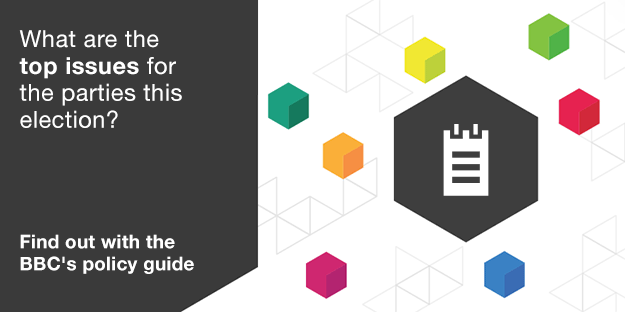
- Published31 March 2015
- Published30 March 2015
